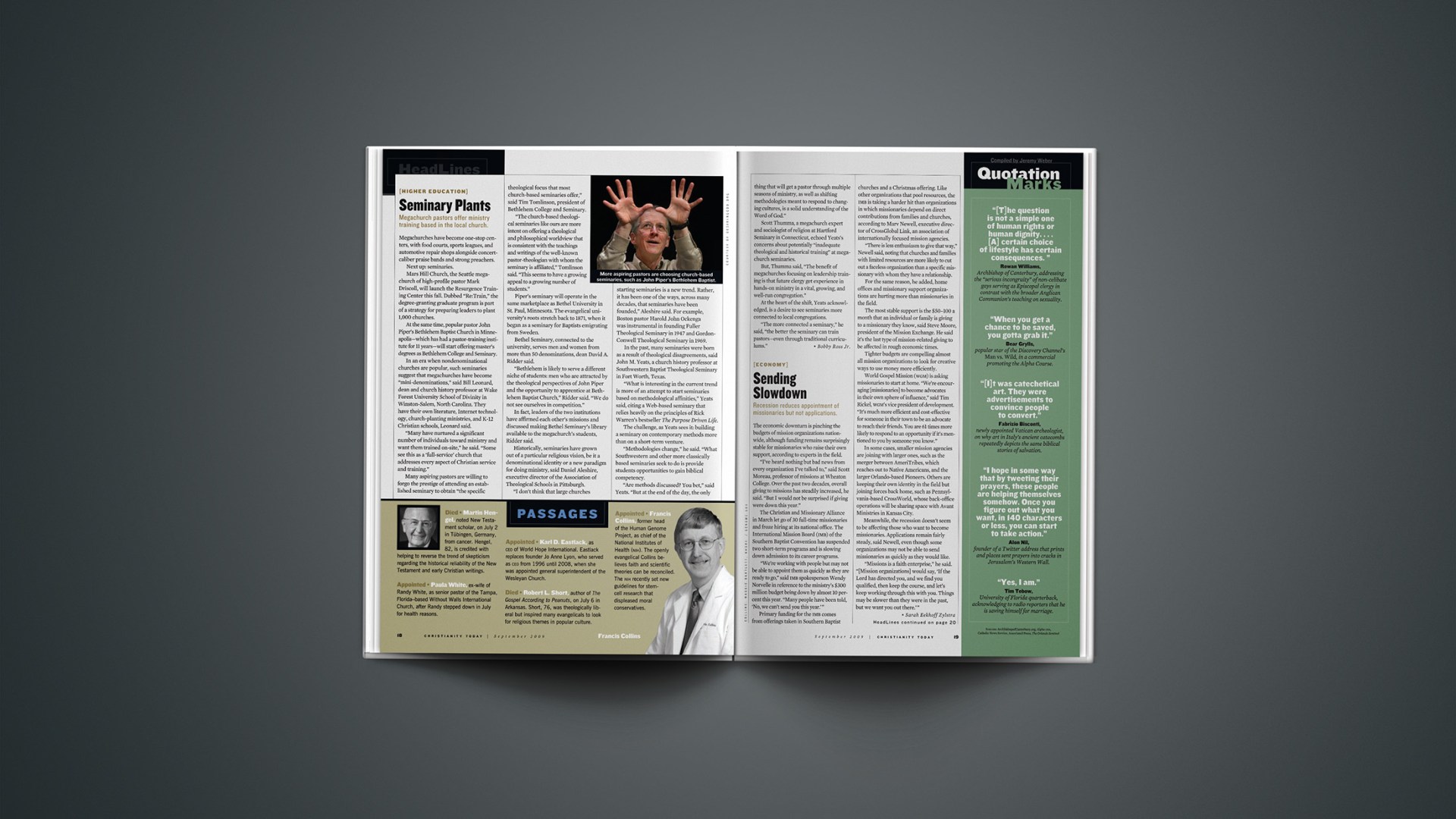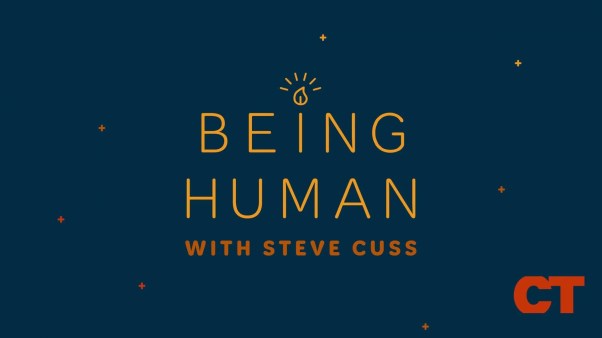Megachurches have become one-stop centers, with food courts, sports leagues, and automotive repair shops alongside concert-caliber praise bands and strong preachers.
Next up: seminaries.
Mars Hill Church, the Seattle megachurch of high-profile pastor Mark Driscoll, will launch the Resurgence Training Center this fall. Dubbed “Re:Train,” the degree-granting graduate program is part of a strategy for preparing leaders to plant 1,000 churches.
At the same time, popular pastor John Piper’s Bethlehem Baptist Church in Minneapolis—which has had a pastor-training institute for 11 years—will start offering master’s degrees as Bethlehem College and Seminary.
In an era when nondenominational churches are popular, such seminaries suggest that megachurches have become “mini-denominations,” said Bill Leonard, dean and church history professor at Wake Forest University School of Divinity in Winston-Salem, North Carolina. They have their own literature, Internet technology, church-planting ministries, and K-12 Christian schools, Leonard said.
“Many have nurtured a significant number of individuals toward ministry and want them trained on-site,” he said. “Some see this as a ‘full-service’ church that addresses every aspect of Christian service and training.”
Many aspiring pastors are willing to forgo the prestige of attending an established seminary to obtain “the specific theological focus that most church-based seminaries offer,” said Tim Tomlinson, president of Bethlehem College and Seminary.
“The church-based theological seminaries like ours are more intent on offering a theological and philosophical worldview that is consistent with the teachings and writings of the well-known pastor-theologian with whom the seminary is affiliated,” Tomlinson said. “This seems to have a growing appeal to a growing number of students.”
Piper’s seminary will operate in the same marketplace as Bethel University in St. Paul, Minnesota. The evangelical university’s roots stretch back to 1871, when it began as a seminary for Baptists emigrating from Sweden.
Bethel Seminary, connected to the university, serves men and women from more than 50 denominations, dean David A. Ridder said.
“Bethlehem is likely to serve a different niche of students: men who are attracted by the theological perspectives of John Piper and the opportunity to apprentice at Bethlehem Baptist Church,” Ridder said. “We do not see ourselves in competition.”
In fact, leaders of the two institutions have affirmed each other’s missions and discussed making Bethel Seminary’s library available to the megachurch’s students, Ridder said.
Historically, seminaries have grown out of a particular religious vision, be it a denominational identity or a new paradigm for doing ministry, said Daniel Aleshire, executive director of the Association of Theological Schools in Pittsburgh.
“I don’t think that large churches starting seminaries is a new trend. Rather, it has been one of the ways, across many decades, that seminaries have been founded,” Aleshire said. For example, Boston pastor Harold John Ockenga was instrumental in founding Fuller Theological Seminary in 1947 and Gordon-Conwell Theological Seminary in 1969.
In the past, many seminaries were born as a result of theological disagreements, said John M. Yeats, a church history professor at Southwestern Baptist Theological Seminary in Fort Worth, Texas.
“What is interesting in the current trend is more of an attempt to start seminaries based on methodological affinities,” Yeats said, citing a Web-based seminary that relies heavily on the principles of Rick Warren’s bestseller The Purpose Driven Life.
The challenge, as Yeats sees it: building a seminary on contemporary methods more than on a short-term venture.
“Methodologies change,” he said. “What Southwestern and other more classically based seminaries seek to do is provide students opportunities to gain biblical competency.
“Are methods discussed? You bet,” said Yeats. “But at the end of the day, the only thing that will get a pastor through multiple seasons of ministry, as well as shifting methodologies meant to respond to changing cultures, is a solid understanding of the Word of God.”
Scott Thumma, a megachurch expert and sociologist of religion at Hartford Seminary in Connecticut, echoed Yeats’s concerns about potentially “inadequate theological and historical training” at megachurch seminaries.
But, Thumma said, “The benefit of megachurches focusing on leadership training is that future clergy get experience in hands-on ministry in a vital, growing, and well-run congregation.”
At the heart of the shift, Yeats acknowledged, is a desire to see seminaries more connected to local congregations.
“The more connected a seminary,” he said, “the better the seminary can train pastors—even through traditional curriculums.”
Copyright © 2009 Christianity Today. Click for reprint information.
Related Elsewhere:
Christianity Today has a special section about education on our site, including:
Seminaries in Peril | Government evaluation threatens training of Swedish pastors. (July 27, 2009)
School’s Out Forever | Recession shuts doors of Christian schools nationwide as enrollments drop. (July 21, 2009)
To Kill or to Love—That Was the Question | Rethinking the image of God helped me to decide. (July 17, 2009)
See our news section and liveblog for more news updates.









